Professional Practices in Nursing: A Comprehensive Report
VerifiedAdded on 2022/08/27
|6
|930
|18
Report
AI Summary
This report delves into the multifaceted realm of professional nursing practices, encompassing critical aspects such as privacy, confidentiality, and patient rights within the Australian healthcare context. It elucidates the significance of the Nursing and Midwifery Board of Australia (NMBA) Code of Conduct, outlining its purpose and importance in clinical settings. The report examines relevant laws and regulations governing privacy and confidentiality, emphasizing the ethical and legal responsibilities of registered nurses. It further explores the Australian Charter of Health Care Rights, discussing its implications for both patients and healthcare professionals. The analysis highlights the importance of informed consent, safe clinical environments, and equitable access to care, providing a comprehensive overview of professional standards in nursing.
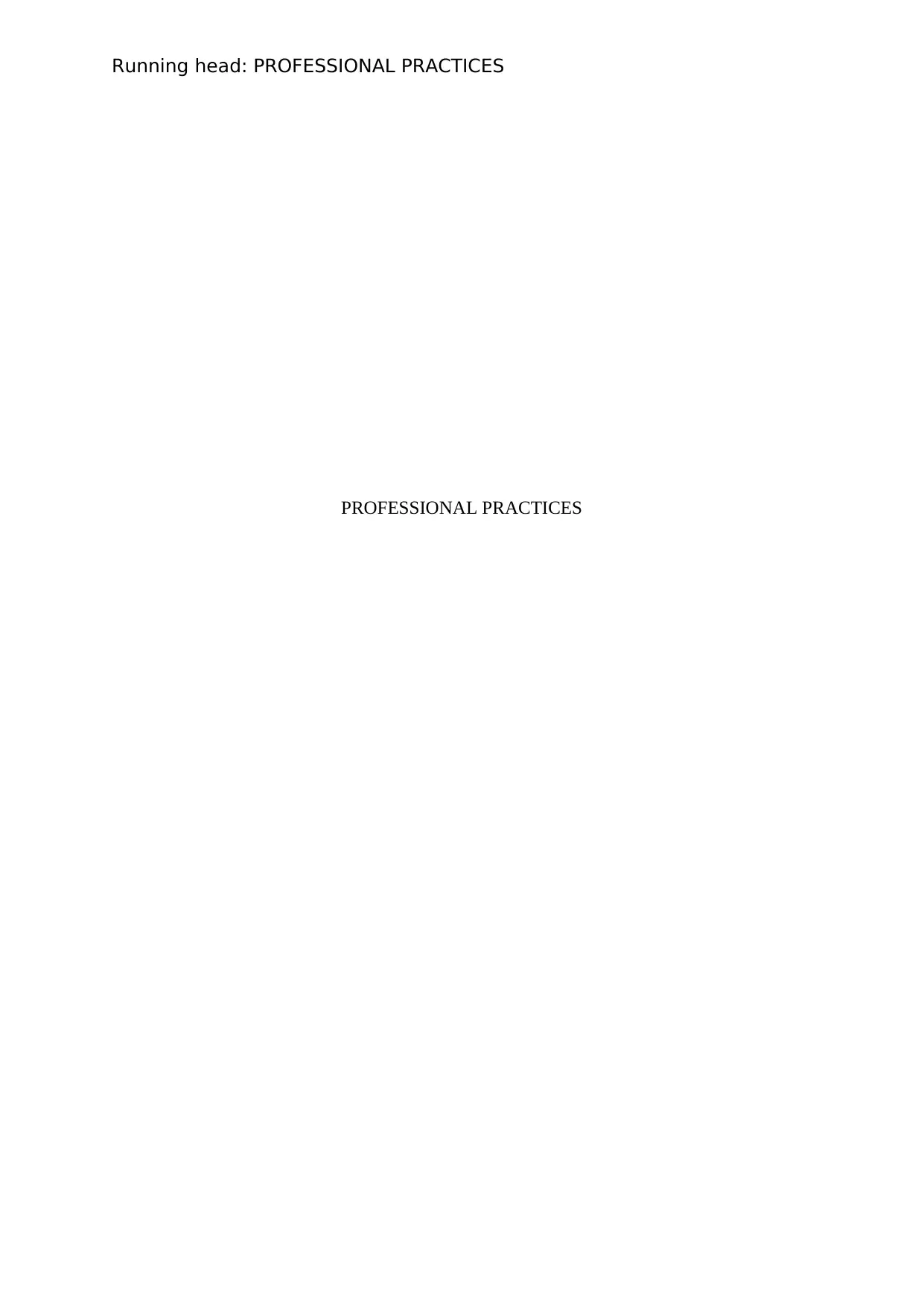
Running head: PROFESSIONAL PRACTICES
PROFESSIONAL PRACTICES
PROFESSIONAL PRACTICES
Paraphrase This Document
Need a fresh take? Get an instant paraphrase of this document with our AI Paraphraser
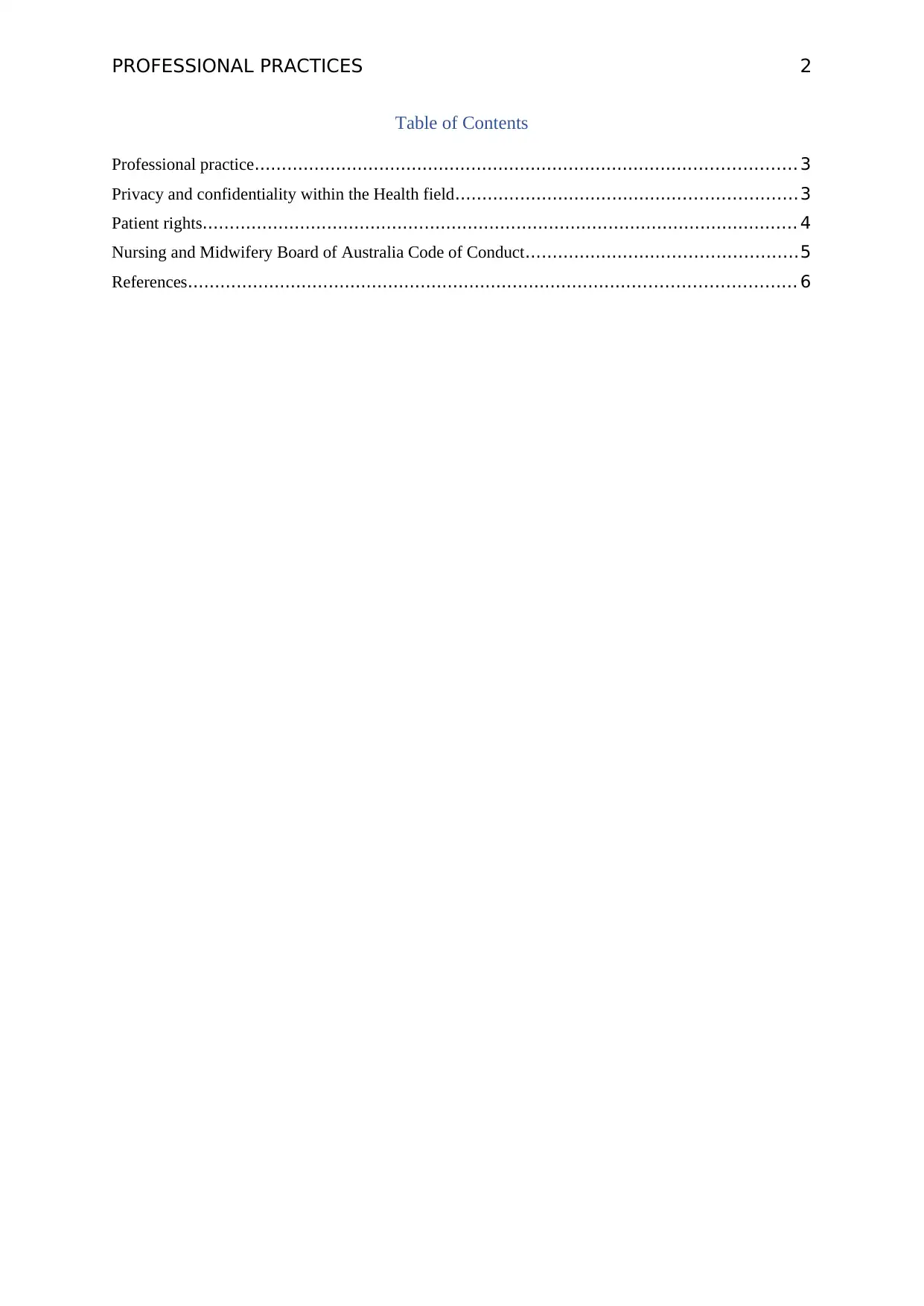
PROFESSIONAL PRACTICES 2
Table of Contents
Professional practice.................................................................................................... 3
Privacy and confidentiality within the Health field...............................................................3
Patient rights.............................................................................................................. 4
Nursing and Midwifery Board of Australia Code of Conduct..................................................5
References................................................................................................................ 6
Table of Contents
Professional practice.................................................................................................... 3
Privacy and confidentiality within the Health field...............................................................3
Patient rights.............................................................................................................. 4
Nursing and Midwifery Board of Australia Code of Conduct..................................................5
References................................................................................................................ 6
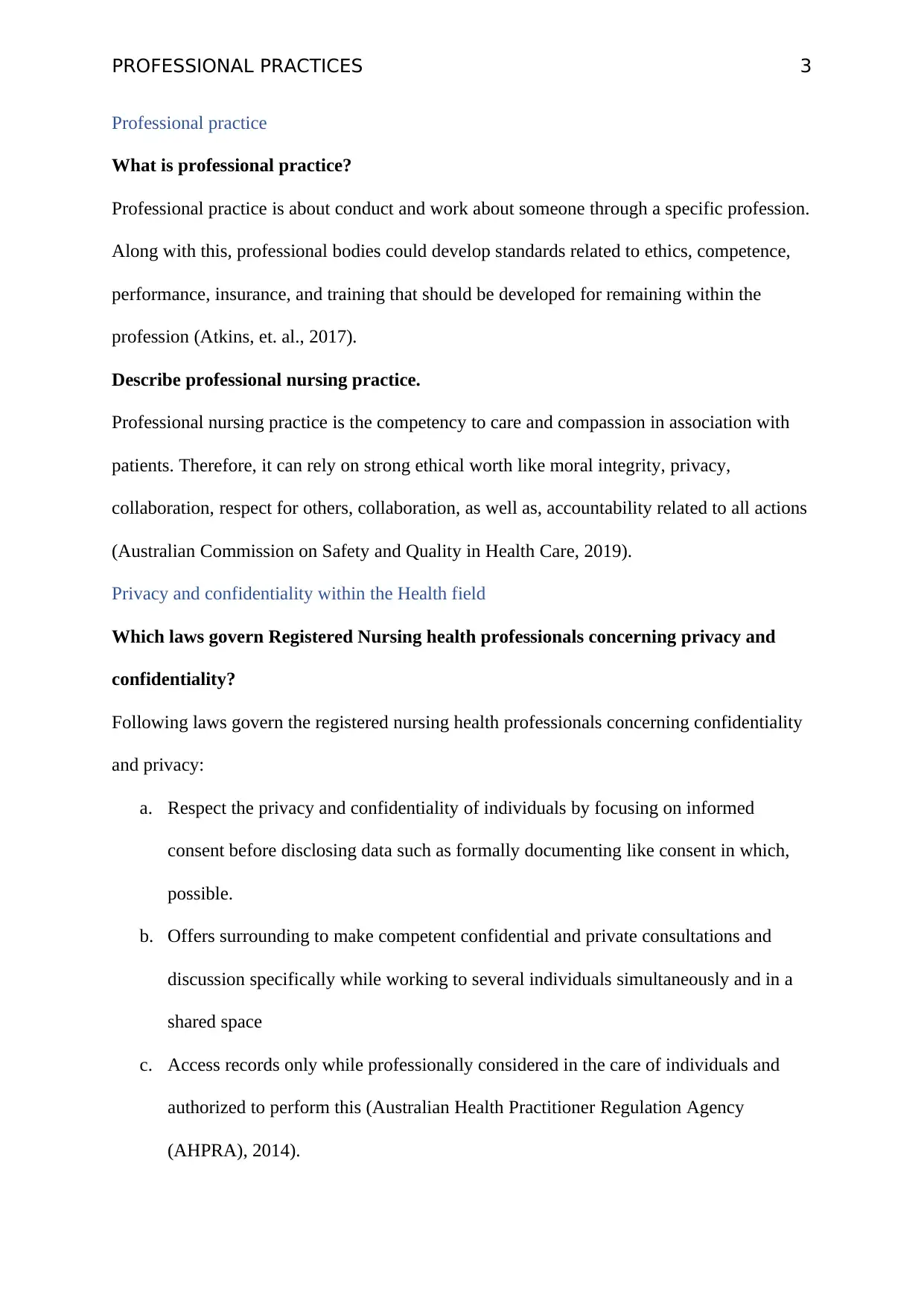
PROFESSIONAL PRACTICES 3
Professional practice
What is professional practice?
Professional practice is about conduct and work about someone through a specific profession.
Along with this, professional bodies could develop standards related to ethics, competence,
performance, insurance, and training that should be developed for remaining within the
profession (Atkins, et. al., 2017).
Describe professional nursing practice.
Professional nursing practice is the competency to care and compassion in association with
patients. Therefore, it can rely on strong ethical worth like moral integrity, privacy,
collaboration, respect for others, collaboration, as well as, accountability related to all actions
(Australian Commission on Safety and Quality in Health Care, 2019).
Privacy and confidentiality within the Health field
Which laws govern Registered Nursing health professionals concerning privacy and
confidentiality?
Following laws govern the registered nursing health professionals concerning confidentiality
and privacy:
a. Respect the privacy and confidentiality of individuals by focusing on informed
consent before disclosing data such as formally documenting like consent in which,
possible.
b. Offers surrounding to make competent confidential and private consultations and
discussion specifically while working to several individuals simultaneously and in a
shared space
c. Access records only while professionally considered in the care of individuals and
authorized to perform this (Australian Health Practitioner Regulation Agency
(AHPRA), 2014).
Professional practice
What is professional practice?
Professional practice is about conduct and work about someone through a specific profession.
Along with this, professional bodies could develop standards related to ethics, competence,
performance, insurance, and training that should be developed for remaining within the
profession (Atkins, et. al., 2017).
Describe professional nursing practice.
Professional nursing practice is the competency to care and compassion in association with
patients. Therefore, it can rely on strong ethical worth like moral integrity, privacy,
collaboration, respect for others, collaboration, as well as, accountability related to all actions
(Australian Commission on Safety and Quality in Health Care, 2019).
Privacy and confidentiality within the Health field
Which laws govern Registered Nursing health professionals concerning privacy and
confidentiality?
Following laws govern the registered nursing health professionals concerning confidentiality
and privacy:
a. Respect the privacy and confidentiality of individuals by focusing on informed
consent before disclosing data such as formally documenting like consent in which,
possible.
b. Offers surrounding to make competent confidential and private consultations and
discussion specifically while working to several individuals simultaneously and in a
shared space
c. Access records only while professionally considered in the care of individuals and
authorized to perform this (Australian Health Practitioner Regulation Agency
(AHPRA), 2014).
⊘ This is a preview!⊘
Do you want full access?
Subscribe today to unlock all pages.

Trusted by 1+ million students worldwide
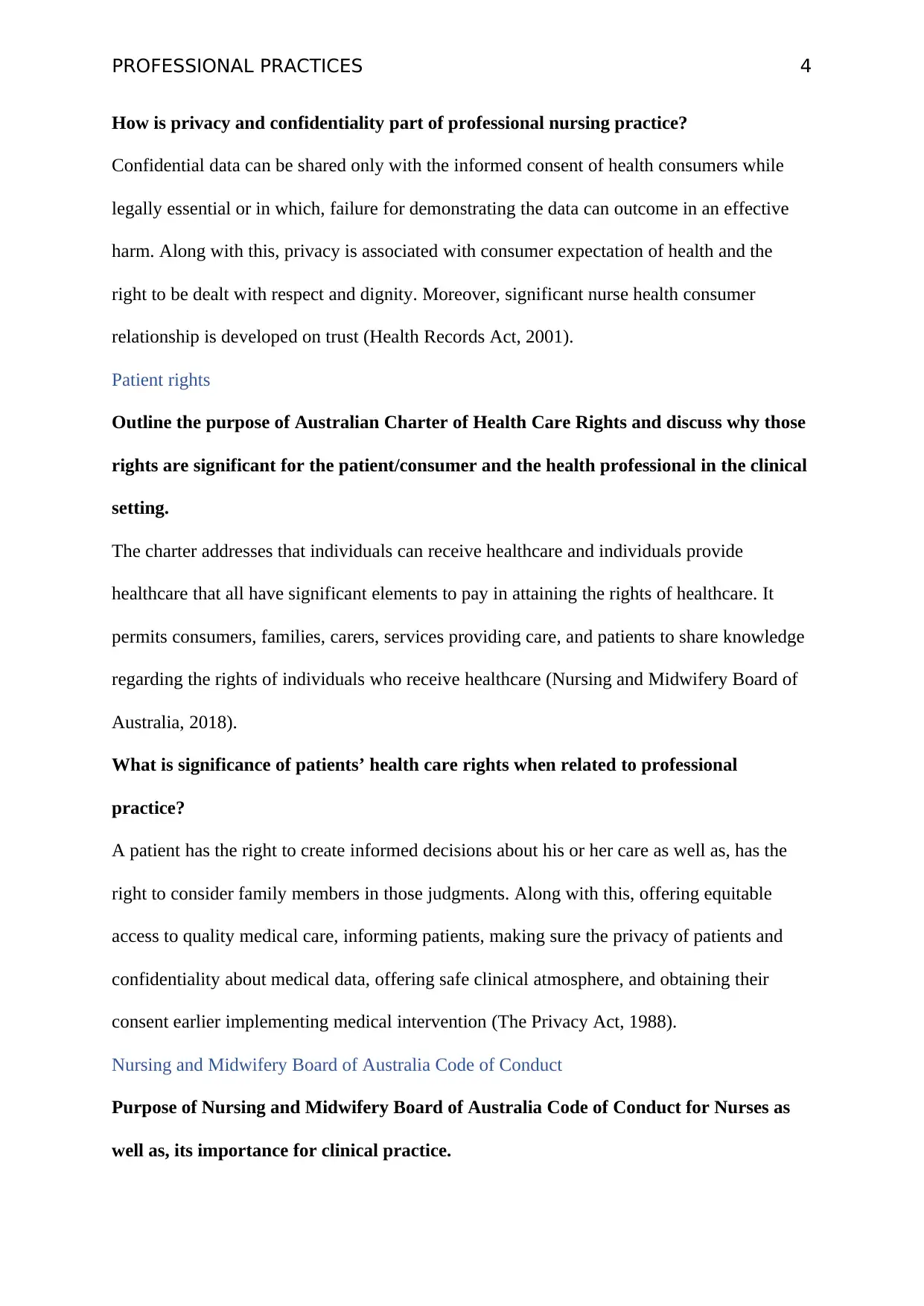
PROFESSIONAL PRACTICES 4
How is privacy and confidentiality part of professional nursing practice?
Confidential data can be shared only with the informed consent of health consumers while
legally essential or in which, failure for demonstrating the data can outcome in an effective
harm. Along with this, privacy is associated with consumer expectation of health and the
right to be dealt with respect and dignity. Moreover, significant nurse health consumer
relationship is developed on trust (Health Records Act, 2001).
Patient rights
Outline the purpose of Australian Charter of Health Care Rights and discuss why those
rights are significant for the patient/consumer and the health professional in the clinical
setting.
The charter addresses that individuals can receive healthcare and individuals provide
healthcare that all have significant elements to pay in attaining the rights of healthcare. It
permits consumers, families, carers, services providing care, and patients to share knowledge
regarding the rights of individuals who receive healthcare (Nursing and Midwifery Board of
Australia, 2018).
What is significance of patients’ health care rights when related to professional
practice?
A patient has the right to create informed decisions about his or her care as well as, has the
right to consider family members in those judgments. Along with this, offering equitable
access to quality medical care, informing patients, making sure the privacy of patients and
confidentiality about medical data, offering safe clinical atmosphere, and obtaining their
consent earlier implementing medical intervention (The Privacy Act, 1988).
Nursing and Midwifery Board of Australia Code of Conduct
Purpose of Nursing and Midwifery Board of Australia Code of Conduct for Nurses as
well as, its importance for clinical practice.
How is privacy and confidentiality part of professional nursing practice?
Confidential data can be shared only with the informed consent of health consumers while
legally essential or in which, failure for demonstrating the data can outcome in an effective
harm. Along with this, privacy is associated with consumer expectation of health and the
right to be dealt with respect and dignity. Moreover, significant nurse health consumer
relationship is developed on trust (Health Records Act, 2001).
Patient rights
Outline the purpose of Australian Charter of Health Care Rights and discuss why those
rights are significant for the patient/consumer and the health professional in the clinical
setting.
The charter addresses that individuals can receive healthcare and individuals provide
healthcare that all have significant elements to pay in attaining the rights of healthcare. It
permits consumers, families, carers, services providing care, and patients to share knowledge
regarding the rights of individuals who receive healthcare (Nursing and Midwifery Board of
Australia, 2018).
What is significance of patients’ health care rights when related to professional
practice?
A patient has the right to create informed decisions about his or her care as well as, has the
right to consider family members in those judgments. Along with this, offering equitable
access to quality medical care, informing patients, making sure the privacy of patients and
confidentiality about medical data, offering safe clinical atmosphere, and obtaining their
consent earlier implementing medical intervention (The Privacy Act, 1988).
Nursing and Midwifery Board of Australia Code of Conduct
Purpose of Nursing and Midwifery Board of Australia Code of Conduct for Nurses as
well as, its importance for clinical practice.
Paraphrase This Document
Need a fresh take? Get an instant paraphrase of this document with our AI Paraphraser
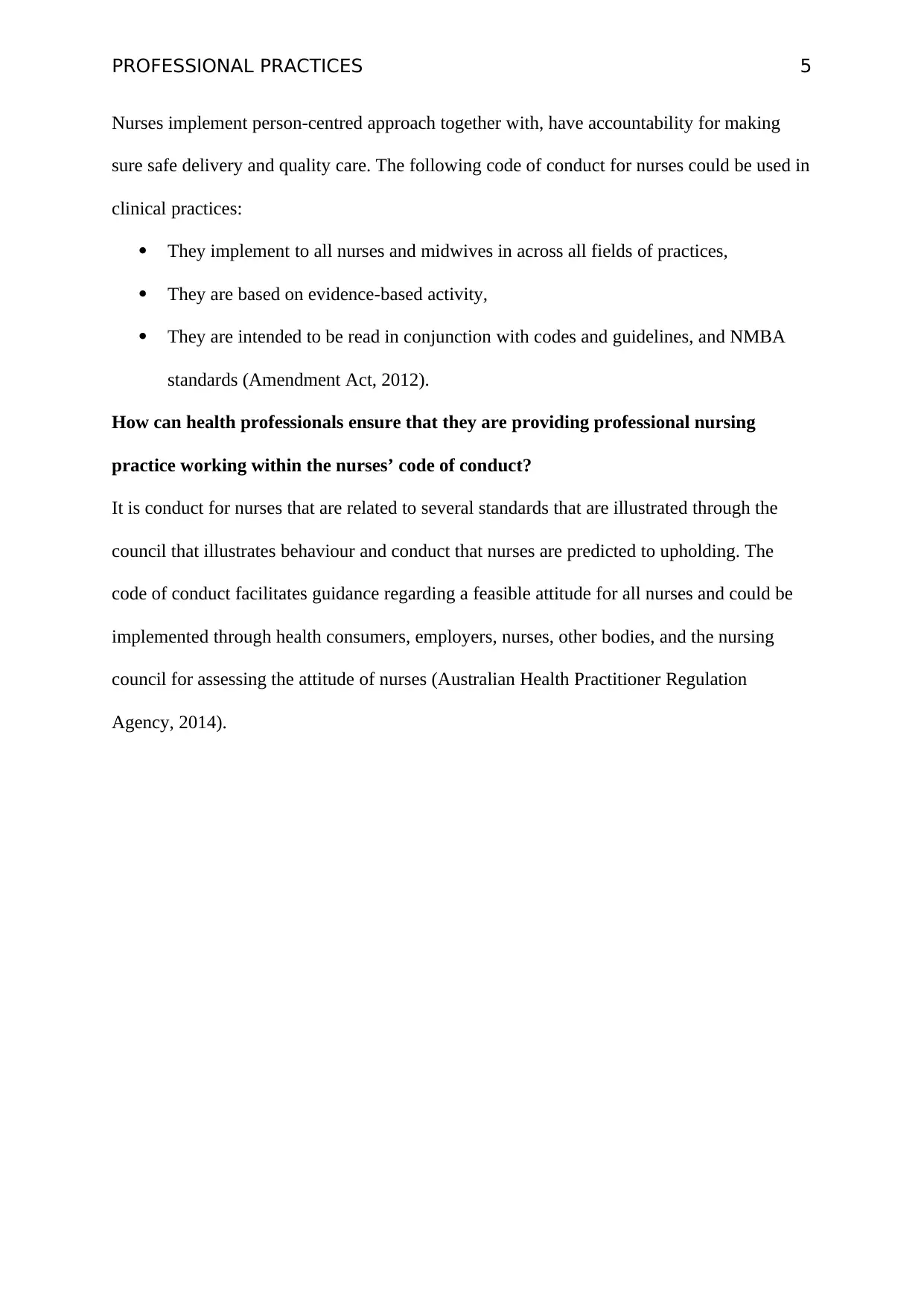
PROFESSIONAL PRACTICES 5
Nurses implement person-centred approach together with, have accountability for making
sure safe delivery and quality care. The following code of conduct for nurses could be used in
clinical practices:
They implement to all nurses and midwives in across all fields of practices,
They are based on evidence-based activity,
They are intended to be read in conjunction with codes and guidelines, and NMBA
standards (Amendment Act, 2012).
How can health professionals ensure that they are providing professional nursing
practice working within the nurses’ code of conduct?
It is conduct for nurses that are related to several standards that are illustrated through the
council that illustrates behaviour and conduct that nurses are predicted to upholding. The
code of conduct facilitates guidance regarding a feasible attitude for all nurses and could be
implemented through health consumers, employers, nurses, other bodies, and the nursing
council for assessing the attitude of nurses (Australian Health Practitioner Regulation
Agency, 2014).
Nurses implement person-centred approach together with, have accountability for making
sure safe delivery and quality care. The following code of conduct for nurses could be used in
clinical practices:
They implement to all nurses and midwives in across all fields of practices,
They are based on evidence-based activity,
They are intended to be read in conjunction with codes and guidelines, and NMBA
standards (Amendment Act, 2012).
How can health professionals ensure that they are providing professional nursing
practice working within the nurses’ code of conduct?
It is conduct for nurses that are related to several standards that are illustrated through the
council that illustrates behaviour and conduct that nurses are predicted to upholding. The
code of conduct facilitates guidance regarding a feasible attitude for all nurses and could be
implemented through health consumers, employers, nurses, other bodies, and the nursing
council for assessing the attitude of nurses (Australian Health Practitioner Regulation
Agency, 2014).
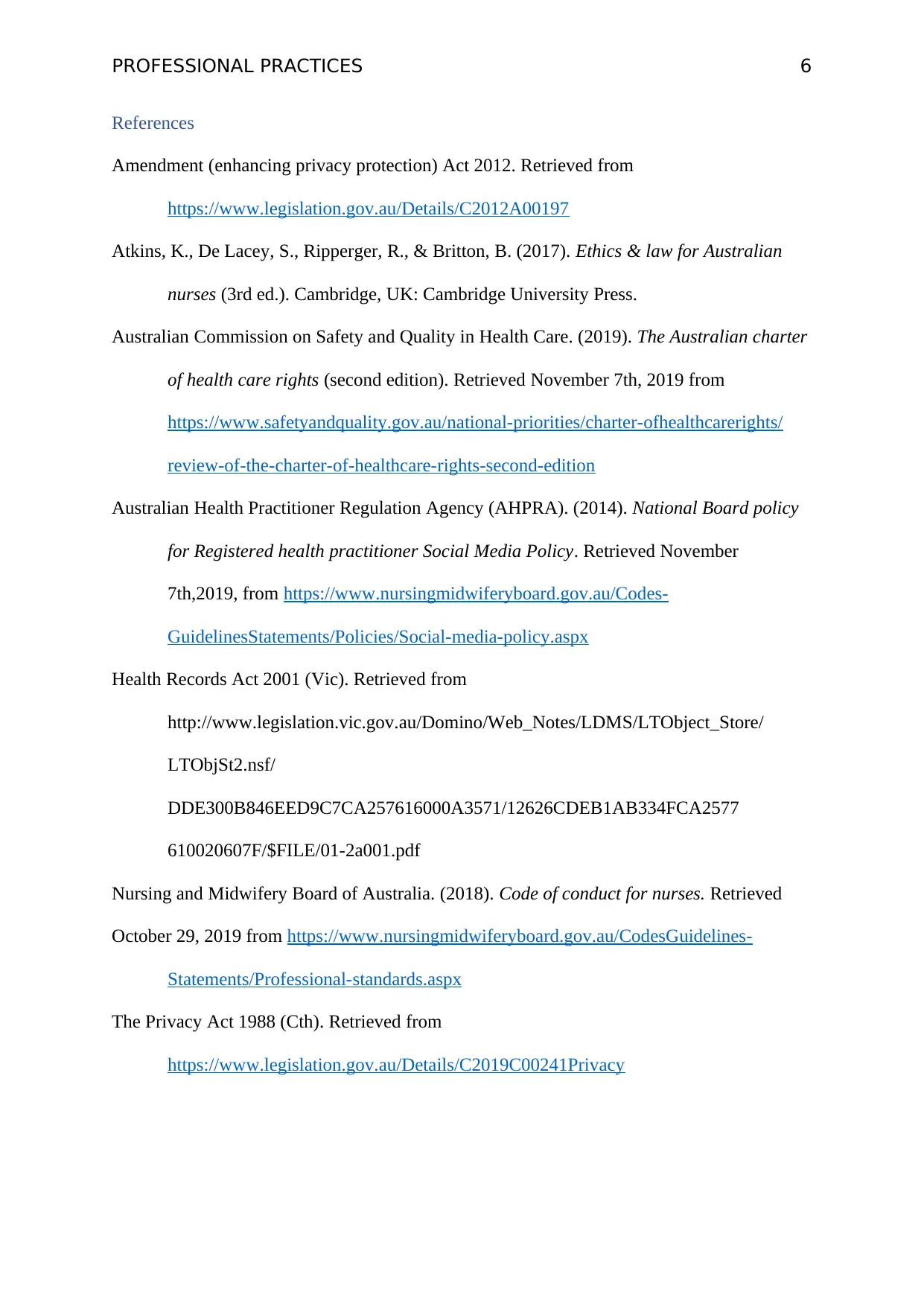
PROFESSIONAL PRACTICES 6
References
Amendment (enhancing privacy protection) Act 2012. Retrieved from
https://www.legislation.gov.au/Details/C2012A00197
Atkins, K., De Lacey, S., Ripperger, R., & Britton, B. (2017). Ethics & law for Australian
nurses (3rd ed.). Cambridge, UK: Cambridge University Press.
Australian Commission on Safety and Quality in Health Care. (2019). The Australian charter
of health care rights (second edition). Retrieved November 7th, 2019 from
https://www.safetyandquality.gov.au/national-priorities/charter-ofhealthcarerights/
review-of-the-charter-of-healthcare-rights-second-edition
Australian Health Practitioner Regulation Agency (AHPRA). (2014). National Board policy
for Registered health practitioner Social Media Policy. Retrieved November
7th,2019, from https://www.nursingmidwiferyboard.gov.au/Codes-
GuidelinesStatements/Policies/Social-media-policy.aspx
Health Records Act 2001 (Vic). Retrieved from
http://www.legislation.vic.gov.au/Domino/Web_Notes/LDMS/LTObject_Store/
LTObjSt2.nsf/
DDE300B846EED9C7CA257616000A3571/12626CDEB1AB334FCA2577
610020607F/$FILE/01-2a001.pdf
Nursing and Midwifery Board of Australia. (2018). Code of conduct for nurses. Retrieved
October 29, 2019 from https://www.nursingmidwiferyboard.gov.au/CodesGuidelines-
Statements/Professional-standards.aspx
The Privacy Act 1988 (Cth). Retrieved from
https://www.legislation.gov.au/Details/C2019C00241Privacy
References
Amendment (enhancing privacy protection) Act 2012. Retrieved from
https://www.legislation.gov.au/Details/C2012A00197
Atkins, K., De Lacey, S., Ripperger, R., & Britton, B. (2017). Ethics & law for Australian
nurses (3rd ed.). Cambridge, UK: Cambridge University Press.
Australian Commission on Safety and Quality in Health Care. (2019). The Australian charter
of health care rights (second edition). Retrieved November 7th, 2019 from
https://www.safetyandquality.gov.au/national-priorities/charter-ofhealthcarerights/
review-of-the-charter-of-healthcare-rights-second-edition
Australian Health Practitioner Regulation Agency (AHPRA). (2014). National Board policy
for Registered health practitioner Social Media Policy. Retrieved November
7th,2019, from https://www.nursingmidwiferyboard.gov.au/Codes-
GuidelinesStatements/Policies/Social-media-policy.aspx
Health Records Act 2001 (Vic). Retrieved from
http://www.legislation.vic.gov.au/Domino/Web_Notes/LDMS/LTObject_Store/
LTObjSt2.nsf/
DDE300B846EED9C7CA257616000A3571/12626CDEB1AB334FCA2577
610020607F/$FILE/01-2a001.pdf
Nursing and Midwifery Board of Australia. (2018). Code of conduct for nurses. Retrieved
October 29, 2019 from https://www.nursingmidwiferyboard.gov.au/CodesGuidelines-
Statements/Professional-standards.aspx
The Privacy Act 1988 (Cth). Retrieved from
https://www.legislation.gov.au/Details/C2019C00241Privacy
⊘ This is a preview!⊘
Do you want full access?
Subscribe today to unlock all pages.

Trusted by 1+ million students worldwide
1 out of 6
Related Documents
Your All-in-One AI-Powered Toolkit for Academic Success.
+13062052269
info@desklib.com
Available 24*7 on WhatsApp / Email
![[object Object]](/_next/static/media/star-bottom.7253800d.svg)
Unlock your academic potential
Copyright © 2020–2026 A2Z Services. All Rights Reserved. Developed and managed by ZUCOL.





